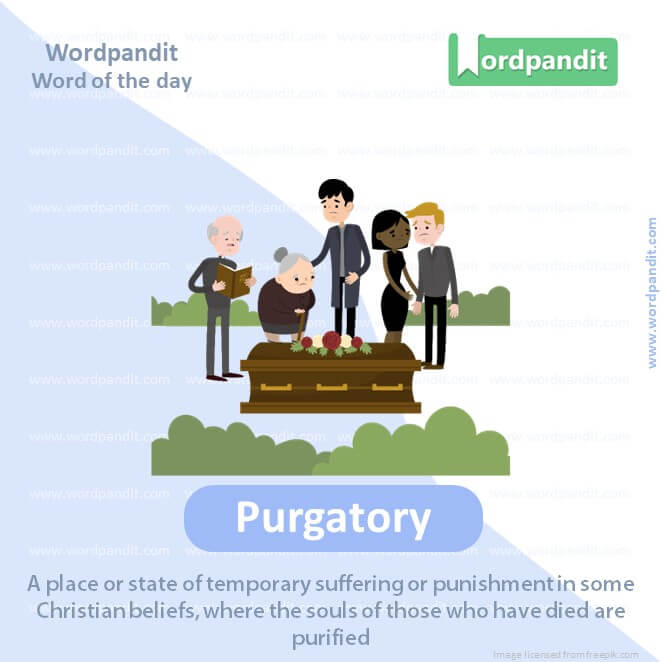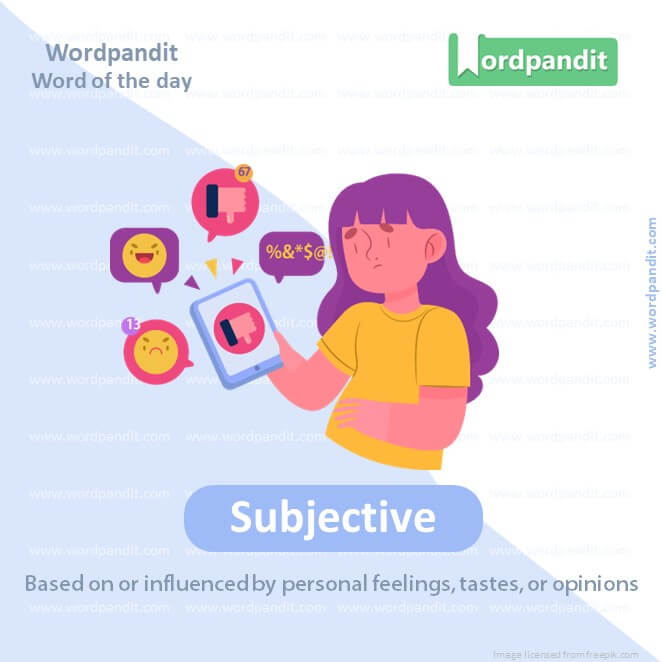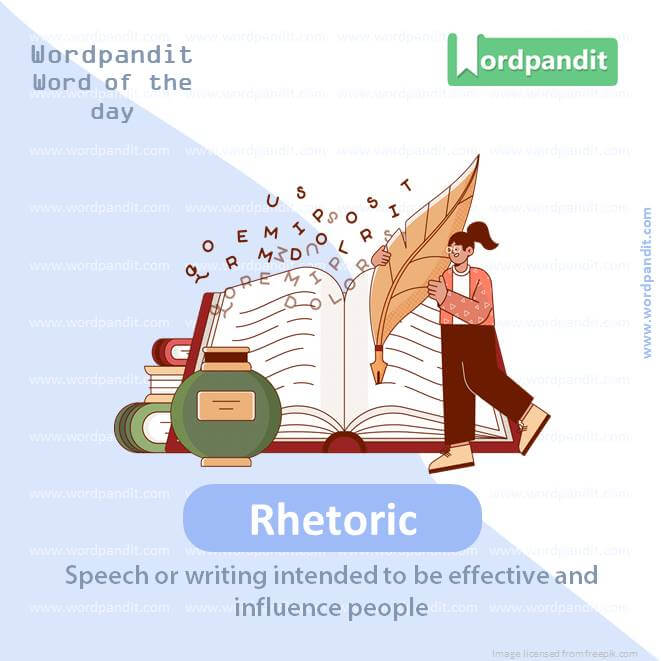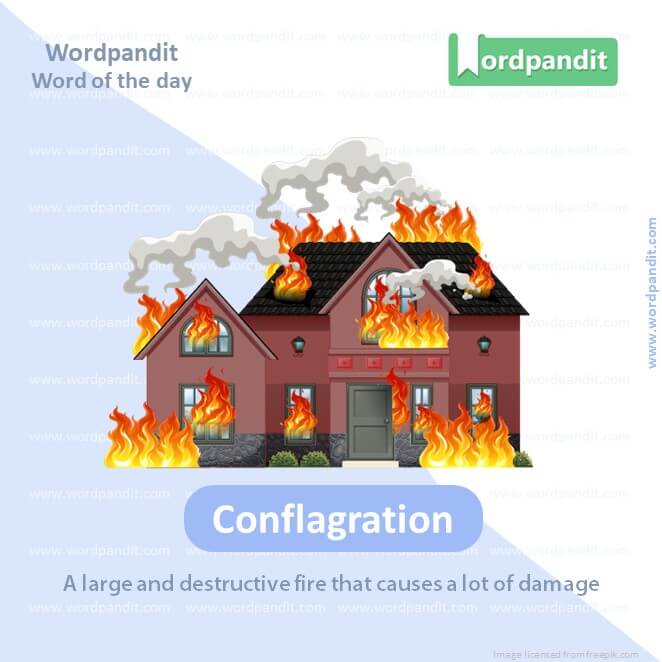Daily Vocabulary Words: List of Daily Used Words in Leading International Newspapers
Hi there. Welcome to this special section @ Wordpandit.
Our endeavour here is very simple: to highlight important daily vocabulary words, which you would come across in leading newspapers in the country. We have included the following newspapers in our selection:
• The New York Times
• The Washington Post
• Scientific American
• BBC
• The Guardian
• Psychology Today
• Wall Street Journal
• The Economist
We are putting in extensive work for developing your vocabulary. All you have got to do is be regular with this section and check out this post on a daily basis. This is your repository of words that are commonly used and essentially, we are posting a list of daily used words. Hence, this has significant practical application as it teaches you words that are used commonly in leading publications mentioned above.
Visit the website daily to learn words from leading international newspapers.

WORD-1: PURGATORY
CONTEXT: The prolonged negotiations between the two nations seemed to be stuck in a diplomatic purgatory, with no clear path to resolution in sight.
SOURCE: The Economist
EXPLANATORY PARAGRAPH: Imagine you have a room where you go to think about something you’ve done wrong before you can go out and play. Purgatory is like that room. It’s a place some people believe your spirit goes to be cleaned up before heading to heaven.
MEANING: A place or state of temporary suffering or punishment in some Christian beliefs, where the souls of those who have died are purified (noun)
PRONUNCIATION: pur-guh-toh-ree
SYNONYMS: Limbo, Intermediate state, Interlude, Transition, Holding area
USAGE EXAMPLES:
1. Some believe souls remain in purgatory until they’ve atoned for their sins.
2. Waiting in the long line felt like an endless purgatory.
3. He described the prison as a purgatory of lost hope.
4. Legends speak of a purgatory where spirits linger before moving on.
WORD-2: REPUDIATE
CONTEXT: The leader’s decision to repudiate the controversial policy sent shockwaves through the party, leading to internal turmoil and debates.
SOURCE: The Washington Post
EXPLANATORY PARAGRAPH: Imagine you have a toy you don’t like anymore, so you say, “I don’t want this!” That’s kind of like “repudiate.” It means to reject or say no to something.
MEANING: To reject or refuse to accept or be associated with. (verb)
PRONUNCIATION: reh-PYOO-dee-ayt
SYNONYMS: Deny, Disavow, Reject, Renounce, Disown
USAGE EXAMPLES:
1. She repudiated the accusations made against her.
2. The politician repudiated his former beliefs.
3. The company repudiated any involvement in the scandal.
4. After reviewing the evidence, he repudiated his earlier statement.
WORD-3: BEWILDER
CONTEXT: In the face of the complex scientific findings, the public was left bewildered, struggling to make sense of the implications for their daily lives.
SOURCE: Scientific American
EXPLANATORY PARAGRAPH: Imagine feeling super confused when you see a magic trick and you don’t know how it was done. That feeling of being really puzzled is called “bewilder.”
MEANING: To confuse or puzzle someone. (verb)
PRONUNCIATION: bih-WILD-er
SYNONYMS: Baffle, Confound, Mystify, Perplex, Flummox
USAGE EXAMPLES:
1. The magic trick bewildered the audience.
2. Her sudden change in mood bewildered him.
3. The maze was designed to bewilder those who entered.
4. The intricate puzzle can easily bewilder anyone who attempts it.

WORD-4: SUBJECTIVE
CONTEXT: The ongoing debate over the healthcare reform bill was marked by subjective arguments, with each side interpreting the data to support their stance.
SOURCE: The New York Times
EXPLANATORY PARAGRAPH: Imagine everyone has special glasses that make things look different for each person. What you see through your glasses is “subjective.” It’s based on your own feelings and not the same for everyone.
MEANING: Based on or influenced by personal feelings, tastes, or opinions (adjective).
PRONUNCIATION: suhb-JEK-tiv
SYNONYMS: Personal, Individual, Biased, Partisan, Personalized
USAGE EXAMPLES:
1. Beauty is a subjective matter; what one person finds attractive, another might not.
2. Reviews about movies are often subjective.
3. His decision was highly subjective and not based on any data.
4. The way we experience pain is subjective and varies from person to person.

WORD-5: RHETORIC
CONTEXT: Political rhetoric reached a fever pitch during the election campaign, as candidates made sweeping promises and engaged in fierce debates.
SOURCE: The Guardian
EXPLANATORY PARAGRAPH: “Rhetoric” is like the special way people use words to persuade or impress others. Sometimes it’s like when adults talk in a fancy way to sound smart or convince someone of something.
MEANING: Speech or writing intended to be effective and influence people (noun).
PRONUNCIATION: REH-tor-ik
SYNONYMS: Oratory, Eloquence, Discourse, Expression, Persuasion
USAGE EXAMPLES:
1. Politicians often use rhetoric to gain support.
2. The teacher taught us the power of rhetoric in writing.
3. His speech was full of empty rhetoric without any real solutions.
4. She is studying ancient Greek rhetoric as part of her degree.
WORD-6: EMBOLDENED
CONTEXT: “The successful negotiations emboldened the diplomats, giving them renewed confidence to tackle other longstanding international issues.”
SOURCE: Al Jazeera
EXPLANATORY PARAGRAPH: Imagine you’re scared to slide down a big slide, but then your friend does it and suddenly you feel brave enough to try. You’ve been “emboldened” by watching your friend.
MEANING: Made more confident or courageous. (verb)
PRONUNCIATION: em-BOHL-dend
SYNONYMS: Encouraged, Heartened, Strengthened, Fortified, Inspired
USAGE EXAMPLE:
1. Seeing her friend stand up to the bully emboldened Lucy to speak out as well.
2. The team’s victory emboldened their hope for the championship.
3. Positive feedback emboldened him to share more of his work.
4. The success of her first book emboldened her to write a sequel.
WORD-7: HINDSIGHT
CONTEXT: “In hindsight, experts agree that early intervention could have averted the environmental disaster, but at the time, the signs were overlooked.”
SOURCE: Scientific American
EXPLANATORY PARAGRAPH: Hindsight is like looking at a situation with “backwards glasses.” It means understanding something after it has happened, even though you might not have understood it while it was happening.
MEANING: Understanding of a situation or event after it has happened. (noun)
PRONUNCIATION: HIND-site
SYNONYMS: Retrospection, Looking back, Review, Recollection, Reflection
USAGE EXAMPLE:
1. In hindsight, he realized he should have studied more for the test.
2. “Hindsight is 20/20,” she said, thinking about her past decisions.
3. With the benefit of hindsight, the team could see where they went wrong.
4. She wished she had the wisdom of hindsight before making her choice.

WORD-8: ARBITRARILY
CONTEXT: “The decision to impose tariffs on certain imports was criticized as being arbitrarily made without a clear economic rationale.”
SOURCE: The Economist
EXPLANATORY PARAGRAPH: Think of choosing a candy from a box without looking. You’re picking it randomly, without a real reason. That’s like “arbitrarily” – doing something without a clear system or reason.
MEANING: In a random manner;based on personal whims or wishes without any reason or system (adverb).
PRONUNCIATION: ahr-BI-trair-uh-lee
SYNONYMS: Randomly, Haphazardly, Unsystematically, Indiscriminately, Aimlessly
USAGE EXAMPLE:
1. They were arbitrarily selected for the task.
2. The teacher arbitrarily assigned partners for the project.
3. Prices seem to change arbitrarily at that store.
4. She arbitrarily picked a card from the deck.

WORD-9: CONFLAGRATION
CONTEXT: “The wildfire, fueled by dry conditions and strong winds, turned into an uncontrollable conflagration, threatening homes and wildlife.”
SOURCE: BBC
EXPLANATORY PARAGRAPH: Imagine a huge fire, like when a big pile of wood all catches fire at once. This big, powerful fire is called a “conflagration.”
MEANING: A large and destructive fire that causes a lot of damage. (noun)
PRONUNCIATION: kon-fluh-GRAY-shun
SYNONYMS: Blaze, Inferno, Firestorm, Holocaust, Wildfire
USAGE EXAMPLE:
1. The conflagration consumed the entire forest in hours.
2. Firefighters battled the conflagration throughout the night.
3. An accidental spark started a conflagration that destroyed several houses.
4. The town’s history was marked by a great conflagration that reshaped its architecture.
WORD-10: HYSTERIA
CONTEXT: “Social media posts spreading false information about the vaccine led to a wave of hysteria, causing a drop in vaccination rates.”
SOURCE: The Washington Post
EXPLANATORY PARAGRAPH: Imagine seeing people getting really, really excited or scared about something all at once. They might scream, cry, or even laugh super hard. This big wave of emotion is called “hysteria.”
MEANING: An uncontrollable outburst of emotion or fear. (noun)
PRONUNCIATION: hi-STAIR-ee-uh
SYNONYMS: Panic, Frenzy, Uproar, Mania, Delirium
USAGE EXAMPLE:
1. The sudden news caused hysteria among the fans.
2. The city was in a state of hysteria after the unexpected victory.
3. Rumors of a lion on the loose caused mass hysteria.
4. The play ended to an outbreak of hysteria and applause from the audience.
Vocabulary List English
Preparing a ‘vocabulary list English’ and learning from it is an effective and systematic strategy for language proficiency. Such a list represents a set of words, often accompanied by their meanings and examples, providing a structured approach to learning. However, simply being exposed to a ‘vocabulary list English’ is not enough. It should be coupled with strategic methods to ensure effective understanding and retention.
Starting off with a ‘vocabulary list English’, it’s essential to view it as a path rather than an obstacle. It’s not about memorizing the entire list in one go, but about perceiving it as an opportunity to explore new words gradually. A balanced approach involves learning few words every day and spending time understanding their meanings, pronunciations, and uses.
In learning from a ‘vocabulary list English’, constant revisions are an indispensable ally. Regular reviewing of words previously learned ensures they become a part of your active vocabulary, resulting in better language proficiency.
Using words from your ‘vocabulary list English’ in everyday communication is a robust method for vocabulary retention. Be it through spoken discussion, written essays, or social media interactions, the usage of new words successfully embeds them in your memory.
Technology can be beneficial in making the learning from a ‘vocabulary list English’ enjoyable and interactive. Numerous language apps and websites provide ‘vocabulary list English’ with regular updates, making the learning engaging and diverse.
In conclusion, successfully learning from a ‘vocabulary list English’ requires a balanced blend of structured learning, regular revisions, active usage, and the inclusion of technological resources. With a patient, consistent and comprehensive approach towards a ‘vocabulary list English’, one can effectively learn new vocabulary and enhance their ability to articulate thoughts and ideas more precisely.











